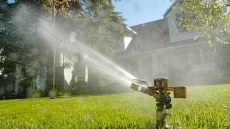OTTAWA — The federal government handed out almost $3 billion in child benefit payments Monday, but will claw back almost $340 million from families when the tax man comes calling in April.
That estimate doesn't include provincial taxes, which are likely to account for about $160 million more, based on calculations by The Canadian Press.
The money is coming from the $2.98 billion handed out Monday to families in the form of increased universal child care benefits, which government ministers were touting at events and online.
Employment Minister Pierre Poilievre called it "Christmas in July" for Canadian families.
The enhanced benefit payments arrived on Monday, with the value rising to $160 from $100 for every child in Canada under age six, and a new $60 per month payment for every child age six to 17.
The increased payments are retroactive to the start of the year, meaning the payments this month will be higher than any before: up to $520 for children under six, and up to $420 for every child six to 17. A small number of families will also receive payments for children who had their 18th birthday during the first six months of the year.
The benefit is taxable on the lower income earner in every household. Canadians who received the payments can expect to see some of it taxed next April unless their income is so low that they don't pay income taxes.
Poilievre's spokeswoman, Meagan Murdoch, said the taxation rules for the program haven't changed since it was introduced in 2006.
The government predicts it will earn $140 million in taxes from child care benefit payments in the 2014-15 fiscal year, and $565 million from a full fiscal year of increased benefit payments in 2015-16, or 11.4 per cent of the benefits doled out. The Canadian Press with help from the Canadian Taxpayers' Federation applied that 11.4 per cent figure to the $2.98 billion in benefits to come to the $339 million estimate.
The increase in benefits, combined with the elimination of the child tax credit, will mean middle and upper-income earners will have more of the money taxed back at the end of the year than lower income households, said David Macdonald, senior economist at the Canadian Centre for Policy Alternatives.
"You get a cheque and it's tangible. You have no idea what you're going to pay back at the end of the year," Macdonald said.
Angella MacEwan, senior economist with the Canadian Labour Council, said the lower income earner in some families will be moved into a higher tax bracket this year because of the government's recent decision to allow income splitting. That will marginally increase how much they are asked to pay in taxes on the child care benefit, she said.
Bank of Canada governor Stephen Poloz said last week the central bank expects about half the money to be spent. The other half would be saved, although Poloz didn't specify how Canadians would save it.
The government estimates that 200,000 of the four million families eligible for the monthly payments have yet to sign up for the program. Employment and Social Development Canada estimates the three territories, Saskatchewan and Prince Edward Island, in that order, have the highest percentage of the population who haven't signed up for the benefits.
Poilievre told The Canadian Press last week the government expects the public focus on the child care benefit will ensure a large percentage of those families sign up.
He said it will take about three weeks for the Canada Revenue Agency to determine how many of the missing families signed up in time.





